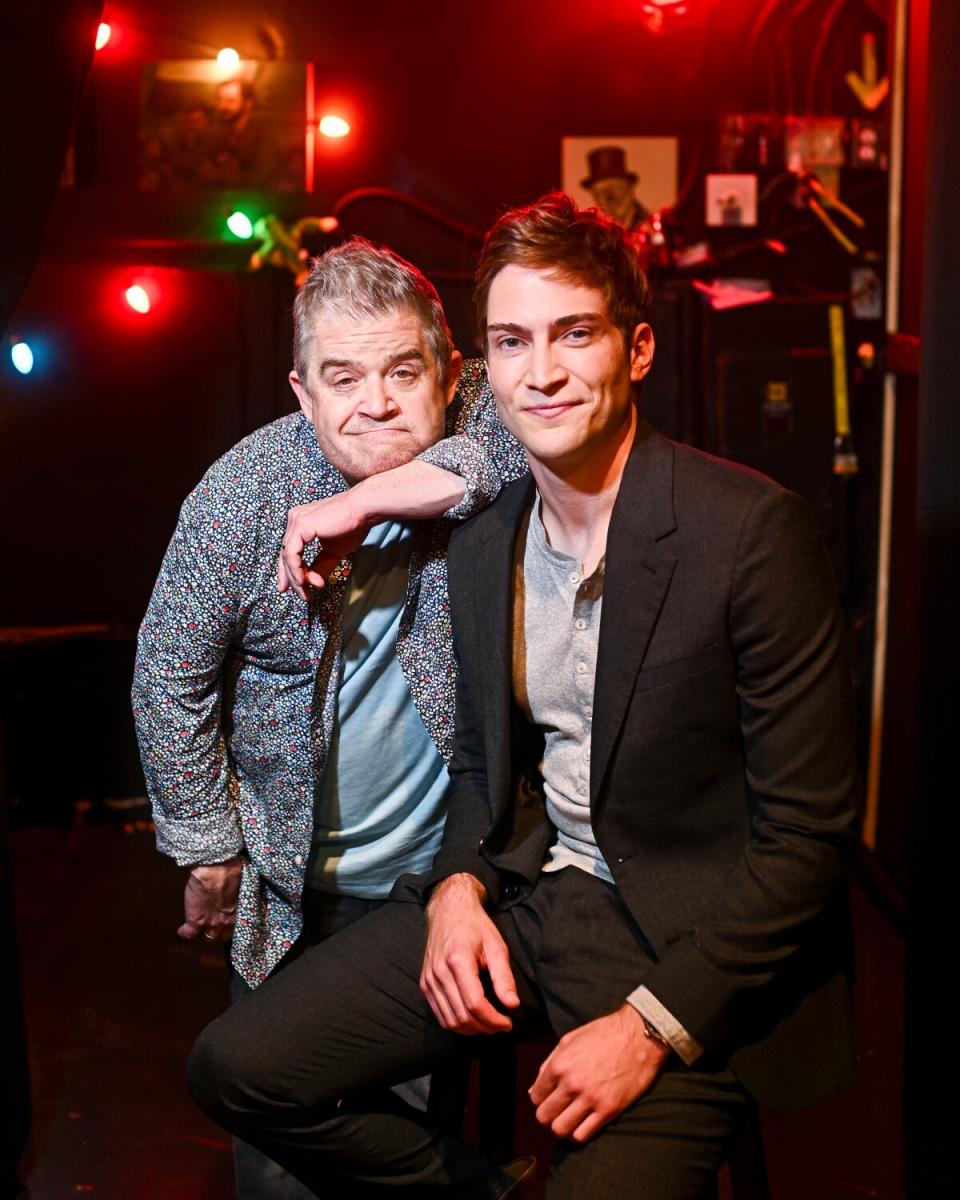A filmmaker was catfished by his own father. Then he cast Patton Oswalt in a movie about it
- Oops!Something went wrong.Please try again later.

The logline for the film “I Love My Dad” includes the phrase “Inspired by a true story. Like, this literally happened to me.” And that is the truth, more or less.
Written by, directed by and starring James Morosini, it's based on something that actually happened between the filmmaker and his father. During a period of estrangement, Morosini’s dad set up a fake social media account posing as an attractive young woman and struck up an online friendship with Morosini.
In the film, Franklin (Morosini) is a twentysomething at a low period in his life, directionless and depressed. His father, Chuck (Patton Oswalt), who has an excuse for every letdown and mistake, never accepts responsibility for his own failed parenting. After Franklin blocks him on social media, Chuck starts an account in the persona of a pretty young waitress named Becca (Claudia Sulewski) and strikes up a relationship with Franklin that escalates quickly. Eventually, Chuck takes Franklin on a road trip to meet online Becca in person, and the truth collides with a carefully constructed fantasy.
Ostensibly a comedy, the film plumbs the emotional depths of Franklin’s depression and Chuck’s inability to own up to all the ways he has let his son down. The film’s unflinching portrait of its outlandish premise places it high on the meter of cringe-worthy moments.
“Those are my favorite kinds of stories,” Morosini said in a recent interview, “the ones that seem like maybe you shouldn't be telling them.
“I really didn't want to make a broad comedy. I didn't want to let the audience off the hook that easy. So you can't quite tell, is this supposed to be funny or is this really sad? It keeps your mind having to interrogate what this is supposed to be. I think that's how things feel often in life where you're laughing and then you're crying.”

Oswalt didn’t fully believe it was a true story when he first read the script, until Morosini explained it himself.
“I just read it, and it said like ‘based on a true story,’ but I thought he was doing a fake-out like in ‘Fargo,’” said Oswalt. “And then he was like, ‘No, here's what happened.’ And he told me. I was like, ‘Well, I gotta do this.’”
The film is the second written by, directed by and starring Morosini following 2018’s microbudget “Threesomething,” a study of male friendship through the emotional complications around a threesome. As an actor, Morosini, 32, has had numerous other roles including “The Sex Lives of College Girls” and “American Horror Story.” “I Love My Dad” won both the grand jury prize and the audience award when it premiered earlier this year at the South by Southwest Film Festival in Austin, Texas, and is now in theaters and on VOD.
In preparing for the role, Oswalt did not meet with or speak to Morosini’s father before shooting.
“I didn't want to think about that. Whatever was in the script was real, even if it's made up," said Oswalt. “It doesn't matter whether this is real or not. I’ve got to make each scene feel real. Did this really happen? It doesn't matter if it's happening in the script.”
Morosini’s father did not read the script before shooting and saw the film for the first time sitting with his son amid a packed audience during one of the screenings at SXSW. Morosini recalled that it was an emotional experience for both of them.
“I felt very protective of him, honestly, and my dad in reality has been a really great father in a lot of ways,” said Morosini. “I think everybody has limitations, and Chuck in the movie has limitations, but the movie is really a kind of a love letter back to my dad. It feels like I'm kind of lovingly catfishing him back."
As for his father’s response, Morosini said, “I mean, he loved it. I think he appreciated the kind of emotional puzzle of the film. I think he just intellectually appreciated that, so I think it made it an easier pill to swallow.”
The movie very much goes there, including scenes of some of the awkward online encounters one flashes on when thinking about the initial premise — one word: “sexting” — but Morosini prefers not to get too far into what did or did not actually happen between himself and his father.
“If I were an audience member, I'd definitely be very curious. I just think that the answer is so much less satisfying than the question,” said Morosini. “Knowing the particulars of what happened and what didn't happen is kind of like learning how a magician does a trick. It stops being interesting. Wonder is something I really appreciate in other films and something that I want to preserve with the experience of this film.”
To prepare for their own onscreen relationship, Morosini and Oswalt watched a lot of movies together. Among their choices were stories of fathers struggling to reconnect with their children by any means such as Sandra Hüller’s “Toni Erdmann,” Chris Columbus’ “Mrs. Doubtfire” and Ronald Bronstein’s fearlessly singular “Frownland.”
“It was important to both of us that we were setting out to make the same film and that we were trying to hit a very precise target tonally,” Morosini said. “So he and I talked a lot about exactly the kind of movie we're trying to make, and process-wise, we rehearsed a ton. We were really trying to be intentional with the kind of movie we were trying to make.”
Even after all their preparations and rehearsal, Morosini was still shocked by how vivid Oswalt’s performance was once production began.
“There was a couple moments where we were shooting it, and I had to remind myself that I'm not just there to appreciate his great work but I need to be acting opposite him and directing him as well,” said Morosini. "There were a couple moments that I was genuinely very moved, when I was acting with him in a scene or watching him, I was almost startled by how affected I was by what he was connecting to in the story.”
At times, Oswalt even shocked himself.
“There was a scene where I'm basically having a nervous breakdown and when the scene was over, I had to go FaceTime my wife and she had to kind of bring me down,” said Oswalt. “And I was like, ‘Was I a bad dad?’ Freaking out thinking I was on the road, so I couldn't be there. That was really tough.”
The part of Chuck is a rare leading role for Oswalt, who has a long career as a stand-up comedian and actor in film and television. His last true lead was the dark indie “Big Fan” in 2009, for which he was nominated for a Gotham Award. His supporting role in 2011’s “Young Adult” also earned him numerous accolades from critics groups.
Which is not to say that Oswalt has not been extremely busy. A simple scan of his Twitter bio mentions enough projects to fill someone else’s entire resume, including the Netflix series “Sandman” and an upcoming comedy special, “Patton Oswalt: We All Scream,” which marks his directorial debut. He co-created the animated series “M.O.D.O.K.” on which he voices the title character and also writes comic books.
Nevertheless, Oswalt understands why he isn’t often tapped for lead roles.
“Look at how I look. I get really fun character actor parts, but you don't put Dwight Frye or Warren Oates as the lead to your big budget film,” he said. “I hate to use the word ‘bankability’ like I'm a f—' agent, but it just depends. I always want to serve the project. So if I'm the lead in something, but it's going to ruin it, I don't want to be s— in something good. If I'm going to work better as a side character, I'd way rather do that and be great in a couple of scenes than, ’Well, he was the lead, but he should have just been in that for 10 minutes.’”
“I aspire to be a Ned Beatty, Billy Green Bush, that whole ’70s era of great character actors,” said Oswalt. “I would love to have that kind of career. If I could have Martin Balsam's career, I'd be happy as a clam.”
The film also marks Oswalt's first producer credit on a feature, a decision born in part from a strategy he acknowledges has multiple motives.
“If I can start increasing my profile as a producer, not only does it mean that I can produce my own things, but if there's some project that I see someone struggling with, than I want to do whatever I can to help,” Oswalt said. “It's like me headlining theaters. Now I get to bring new comics that I really, really like to come out and open for me and expose them to a wider audience.
“So it’s partially a form of cinema buff greed where I want more stuff that I like to get made,” Oswalt added. “That's always been my philosophy. The reason I got into show business was I started off liking movies. I didn't start off liking money and fame. I liked the movies, so I want those to happen. Everything else is just incidental.”
The process of making "I Love My Dad" was an emotional one for Morosini, and he hopes to take audiences on a similar emotional roller-coaster journey.
“I think Franklin in the beginning of the movie sees things as very black and white, people are either good or bad, honest or dishonest,” he said. ”And by the end of the film, he realizes we're all good and bad. We're all honest and dishonest. And I think he sees himself in his dad by the end. And I think that's what I learned as well through making the film, more deeply appreciating that if we were in those circumstances, we might do the same exact thing.
“We're all dishonest in some way or another,” Morosini added, “and I wanted to make a movie where there weren't any good guys or bad guys and force audiences to kind of reckon with that idea.”
This story originally appeared in Los Angeles Times.

